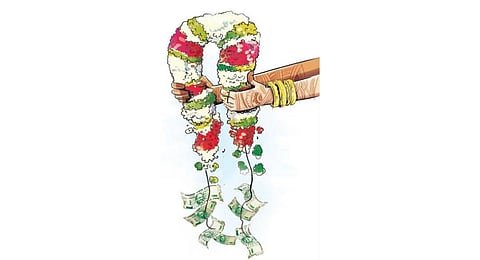

BENGALURU: While Bengaluru in the recently released National Crime Records Bureau (NCRB) report for 2022 ranked third for crime against women (1,194 cases) in metropolitan cities, a recently conducted experiential case study highlighted a bigger problem in the IT Capital.
The analysis of 30 case studies on women from 40 of the city’s slums showed that the majority of them were struggling to make ends meet and had an average of two children dependent on them at a very young age.
The preliminary analysis, which started in November, is being conducted by the Mahila Slum Sanghatane and ActionAid Association, where several individuals were extensively interviewed. In the ongoing campaign to end child marriages and promote a ‘Violence Free Home’ — several street plays, documentary screenings, and candlelight marches were held in seven wards of the city.
Ninety per cent of the women who were contacted were below the age of 25 and 19 of them were married before they turned 18. Six females were married before the age of 21 which is the proposed legal age for girls.
Seventy per cent of these 30 women are living in rented houses in slums such as KP Agrahara, Bakshi Garden, Anandapuram and many more. The report also found that most of these women belonged to Scheduled Caste and Minority communities and 19 were widowed at a young age. Eleven husbands committed suicide due to alcohol addiction, debt or due to pressure. Jancy Rani, project coordinator, Mahila Slum Sanghatane, said, “Most of these women are living in dire conditions and are engaged in petty jobs such as house helps, street vendors and waste pickers. They were married off early, most of them during Covid-19 when families were not doing well.”
These women earn an average of Rs 3,000 per month with only education up to Grade 8. Twenty-seven are also burdened with the responsibility of raising at least two children.
The group wants the government to advocate strongly against child marriages and the crimes committed against women. Nandini A, state lead, ActionAid said, “We plan to continue the analysis and get 50-100 more case studies on record by March 2024. We have also sent a report to the government to provide aid for these women.” The report suggests that the government should conduct a social analysis of young women subjected to child marriage in the state, and design special programmes for them and their children. “They should also include sex education in the curriculum for adolescents, to address the issue at the grassroot,” added Jancy.